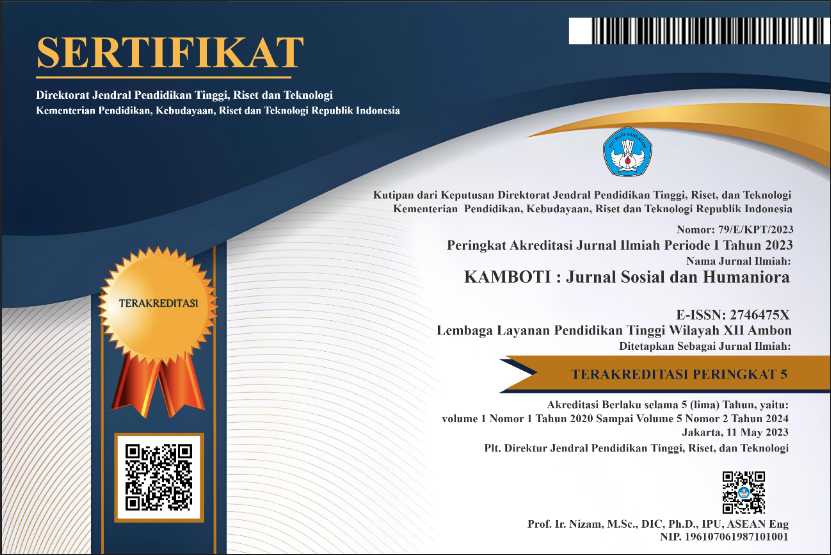The Role of Consumption Values in Shaping Household Shopping Behavior through Food Delivery Apps
DOI:
https://doi.org/10.51135/kambotivol4issue2page79-87Keywords:
Consumption Value, Food Delivery App, Consumer Behavior, Non-Working HousewivesAbstract
References
Adnan. (2018). Pengaruh Perilaku Konsumen terhadap Keputusan Pembelian Susu Morinaga di Kota Lhokseumawe. Jurnal Visioner Dan Manajemen, 7(2).
Chakraborty, D., Kayal, G., Mehta, P., Nunkoo, R., & Rana, N. P. (2022). Consumers’ usage of food delivery app: a theory of consumption values. Journal of Hospitality Marketing and Management, 31(5), 601–619. https://doi.org/10.1080/19368623.2022.2024476
Chakraborty, D., Siddiqui, A., Siddiqui, M., & Mohmmad H Alatawi, F. (2022). Exploring consumer purchase intentions and behavior of buying ayurveda products using SOBC framework. Journal of Retailing and Consumer Services, 65. https://doi.org/10.1016/j.jretconser.2021.102889
Choi, D., & Johnson, K. K. P. (2019). Influences of environmental and hedonic motivations on intention to purchase green products: An extension of the theory of planned behavior. Sustainable Production and Consumption, 18, 145–155. https://doi.org/10.1016/j.spc.2019.02.001
Chung, J. F., Al-Khaled, A. A. S., & Qushairi, Q. B. M. (2022). The Relationship Between Perceived Factors Related to Consumers’ Purchase Intention Towards Online Food Delivery. International Journal of Innovation, Creativity and Change,(October), 38–56.
Fadhilah, N. F., & Arief, N. N. (2023). Customer Equity Model: Analysis Of Online Food Delivery Services In Indonesia. Journal of Business and Management Review, 4(8), 577–597.
Finfolk. (2022). Menjamurnya Bisnis Food Delivery, Tanda Ekosistem Bisnis Makanan Nggak Pernah Surut. https://www.finfolk.co/article/startup/menjamurnya-bisnis-food-delivery,-tanda-ekosistem-bisnis-makanan-nggak-pernah-surut
Gârdan, D. A., Epuran, G., Paștiu, C. A., Gârdan, I. P., Jiroveanu, D. C., Tecău, A. S., & Prihoancă, D. M. (2021). Enhancing consumer experience through development of implicit attitudes using food delivery applications. Journal of Theoretical and Applied Electronic Commerce Research, 16(7), 2858–2882. https://doi.org/10.3390/jtaer16070157
Gupta, S., Chopra, R., Tanwar, S., & Manjhi, S. K. (2021). Consumer Trust in Mobile Food Delivery Apps: Exploring the Antecedents and Consequences. International Journal of Mobile Human Computer Interaction, 13(1), 33–55. https://doi.org/10.4018/IJMHCI.2021010103
Indriyarti, E. R., Christian, M., Yulita, H., Ruminda, M., Sunarno, S., & Wibowo, S. (2022). Online Food Delivery App Distribution and Determinants of Jakarta’s Gen Z Spending Habits. Journal of Distribution Science, 20(7), 73–86. https://doi.org/10.15722/jds.20.07.202207.73
Jitendrabhai, P. F. (2021). Youth Behaviour towards Electronic Food Delivery Platforms. VEER NARMAD SOUTH GUJARAT UNIVERSITY.
Joshi, Y., Yadav, R., & Shankar, A. (2021). The interplay of emotional value, trend affinity and past practices in sustainable consumption: an application of theory of reciprocal determinism. Journal of Strategic Marketing, 1–19. https://doi.org/10.1080/0965254X.2021.1914133
Penggunaan Aplikasi Pesan-Antar Makanan Indonesia Tertinggi di Dunia, (2021) (testimony of KataDATA). https://databoks.katadata.co.id/datapublish/2021/02/18/penggunaan-aplikasi-pesan-antar-makanan-indonesia-tertinggi-di-dunia
Kaur, P., Dhir, A., Ray, A., Bala, P. K., & Khalil, A. (2021). Innovation resistance theory perspective on the use of food delivery applications. Journal of Enterprise Information Management, 34(6), 1746–1768. https://doi.org/10.1108/JEIM-03-2020-0091
Kaur, P., Dhir, A., Talwar, S., & Ghuman, K. (2020). The value proposition of food delivery apps from the perspective of theory of consumption value. International Journal of Contemporary Hospitality Management, 33(4), 1129–1159. https://doi.org/10.1108/IJCHM-05-2020-0477
Kızılkaya, E., & Rızvanoğlu, K. (2020). Evaluating One-Handed Usability of Phablets: A Comparative Study into Turkey’s Leading Food and Grocery Delivery Applications: Vol. 12201 LNCS (M. A. & R. E. (eds.); pp. 294–312). Springer. https://doi.org/10.1007/978-3-030-49760-6_21
Muhamed, A. A., Ab Rahman, M. N., Mohd Hamzah, F., Che Mohd Zain, C. R., & Zailani, S. (2019). The impact of consumption value on consumer behaviour. British Food Journal, 121(11), 2951–2966. https://doi.org/10.1108/BFJ-10-2018-0692
Paço, A. do, Shiel, C., & Alves, H. (2019). A new model for testing green consumer behaviour. Journal of Cleaner Production, 207, 998–1006. https://doi.org/10.1016/j.jclepro.2018.10.105
Ramesh, R., Venkatesa Prabhu, S., Sasikumar, B., Kiruthika Devi, B. S., Prasath, P., & Praveena Rachel Kamala, S. (2022). An empirical study of online food delivery services from applications perspective. Materials Today: Proceedings. https://doi.org/10.1016/j.matpr.2021.05.500
Ray, A., Dhir, A., Bala, P. K., & Kaur, P. (2019). Why do people use food delivery apps (FDA)? A uses and gratification theory perspective. Journal of Retailing and Consumer Services, 51, 221–230. https://doi.org/10.1016/j.jretconser.2019.05.025
Sangadji, S. S., & Handriana, T. (2023). The effect of consumption value on consumer changes behavior in usage of food delivery applica-tions in the era of society 5.0. International Journal of Data and Network Science, 7(2), 729–736. https://doi.org/10.5267/j.ijdns.2023.2.005
Sheth, J. N., Newman, B. I., & Gross, B. L. (1991). Why we buy what we buy: A theory of consumption values. Journal of Business Research, 22(2), 159–170. https://doi.org/10.1016/0148-2963(91)90050-8
Singh, K., Dabas, S., Singhal, J., & Gautam, G. (2020). HungerDeal: India’s First Food Delivery Price Comparison App. 76–81. https://doi.org/10.1145/3429290.3429305
Suhartanto, D., Helmi Ali, M., Tan, K. H., Sjahroeddin, F., & Kusdibyo, L. (2019). Loyalty toward online food delivery service: the role of e-service quality and food quality. Journal of Foodservice Business Research, 22(1), 81–97. https://doi.org/10.1080/15378020.2018.1546076
Sungboonlue, P., Thanakaew, S., Rangseepanya, K., Tangpatong, T., & Siriborvornratanakul, T. (2022). A study of redesigning food delivery application in Thailand. Telkomnika (Telecommunication Computing Electronics and Control), 20(5), 1073–1082. https://doi.org/10.12928/TELKOMNIKA.v20i5.24094
Tran, V. D. (2021). Using mobile food delivery applications during the covid‐19 pandemic: Applying the theory of planned behavior to examine continuance behavior. Sustainability (Switzerland), 13(21). https://doi.org/10.3390/su132112066
Wiastuti, R. D., Prawira, O., Lusyana, L., Lestari, N. S., Masatip, A., & Ngatemin, N. (2022). The Relationship Between Convenience Motivation, Attitude, and Behavioral Intention of Food Delivery Applications’ Users. Geojournal of Tourism and Geosites, 41(2), 548–554. https://doi.org/10.30892/gtg.41228-862
Downloads
Published
Issue
Section
License
Copyright (c) 2025 KAMBOTI: Jurnal Sosial dan Humaniora

This work is licensed under a Creative Commons Attribution-ShareAlike 4.0 International License.



